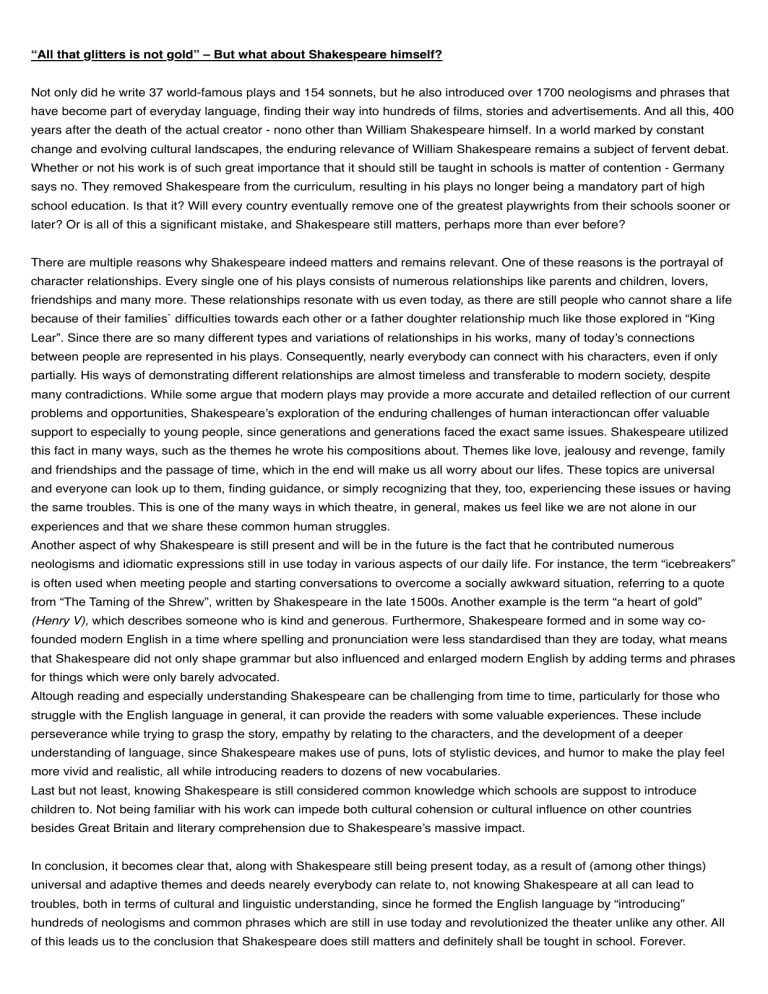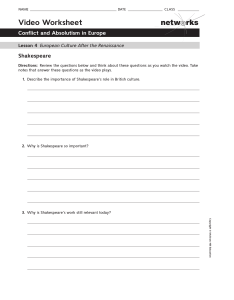
“All that glitters is not gold” – But what about Shakespeare himself? Not only did he write 37 world-famous plays and 154 sonnets, but he also introduced over 1700 neologisms and phrases that have become part of everyday language, finding their way into hundreds of films, stories and advertisements. And all this, 400 years after the death of the actual creator - nono other than William Shakespeare himself. In a world marked by constant change and evolving cultural landscapes, the enduring relevance of William Shakespeare remains a subject of fervent debat. Whether or not his work is of such great importance that it should still be taught in schools is matter of contention - Germany says no. They removed Shakespeare from the curriculum, resulting in his plays no longer being a mandatory part of high school education. Is that it? Will every country eventually remove one of the greatest playwrights from their schools sooner or later? Or is all of this a significant mistake, and Shakespeare still matters, perhaps more than ever before? There are multiple reasons why Shakespeare indeed matters and remains relevant. One of these reasons is the portrayal of character relationships. Every single one of his plays consists of numerous relationships like parents and children, lovers, friendships and many more. These relationships resonate with us even today, as there are still people who cannot share a life because of their families` difficulties towards each other or a father doughter relationship much like those explored in “King Lear”. Since there are so many different types and variations of relationships in his works, many of today’s connections between people are represented in his plays. Consequently, nearly everybody can connect with his characters, even if only partially. His ways of demonstrating different relationships are almost timeless and transferable to modern society, despite many contradictions. While some argue that modern plays may provide a more accurate and detailed reflection of our current problems and opportunities, Shakespeare’s exploration of the enduring challenges of human interactioncan offer valuable support to especially to young people, since generations and generations faced the exact same issues. Shakespeare utilized this fact in many ways, such as the themes he wrote his compositions about. Themes like love, jealousy and revenge, family and friendships and the passage of time, which in the end will make us all worry about our lifes. These topics are universal and everyone can look up to them, finding guidance, or simply recognizing that they, too, experiencing these issues or having the same troubles. This is one of the many ways in which theatre, in general, makes us feel like we are not alone in our experiences and that we share these common human struggles. Another aspect of why Shakespeare is still present and will be in the future is the fact that he contributed numerous neologisms and idiomatic expressions still in use today in various aspects of our daily life. For instance, the term “icebreakers” is often used when meeting people and starting conversations to overcome a socially awkward situation, referring to a quote from “The Taming of the Shrew”, written by Shakespeare in the late 1500s. Another example is the term “a heart of gold” (Henry V), which describes someone who is kind and generous. Furthermore, Shakespeare formed and in some way cofounded modern English in a time where spelling and pronunciation were less standardised than they are today, what means that Shakespeare did not only shape grammar but also influenced and enlarged modern English by adding terms and phrases for things which were only barely advocated. Altough reading and especially understanding Shakespeare can be challenging from time to time, particularly for those who struggle with the English language in general, it can provide the readers with some valuable experiences. These include perseverance while trying to grasp the story, empathy by relating to the characters, and the development of a deeper understanding of language, since Shakespeare makes use of puns, lots of stylistic devices, and humor to make the play feel more vivid and realistic, all while introducing readers to dozens of new vocabularies. Last but not least, knowing Shakespeare is still considered common knowledge which schools are suppost to introduce children to. Not being familiar with his work can impede both cultural cohension or cultural influence on other countries besides Great Britain and literary comprehension due to Shakespeare’s massive impact. In conclusion, it becomes clear that, along with Shakespeare still being present today, as a result of (among other things) universal and adaptive themes and deeds nearely everybody can relate to, not knowing Shakespeare at all can lead to troubles, both in terms of cultural and linguistic understanding, since he formed the English language by “introducing” hundreds of neologisms and common phrases which are still in use today and revolutionized the theater unlike any other. All of this leads us to the conclusion that Shakespeare does still matters and definitely shall be tought in school. Forever.






